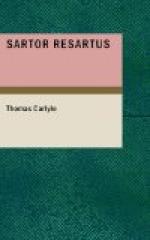Alas, how can a man with this devilishness of temper make way for himself in Life; where the first problem, as Teufelsdrockh too admits, is “to unite yourself with some one, and with somewhat (sich anzuschliessen)”? Division, not union, is written on most part of his procedure. Let us add too that, in no great length of time, the only important connection he had ever succeeded in forming, his connection with the Zahdarm Family, seems to have been paralyzed, for all practical uses, by the death of the “not uncholeric” old Count. This fact stands recorded, quite incidentally, in a certain Discourse on Epitaphs, huddled into the present Bag, among so much else; of which Essay the learning and curious penetration are more to be approved of than the spirit. His grand principle is, that lapidary inscriptions, of what sort soever, should be Historical rather than Lyrical. “By request of that worthy Nobleman’s survivors,” says he, “I undertook to compose his Epitaph; and not unmindful of my own rules, produced the following; which however, for an alleged defect of Latinity, a defect never yet fully visible to myself, still remains unengraven;”—wherein, we may predict, there is more than the Latinity that will surprise an English reader:
HIC JACET
PHILIPPUS ZAEHDARM,
COGNOMINE MAGNUS,
ZAEHDARMI COMES,
EX IMPERII CONCILIO,
VELLERIS AUREI, PERISCELIDIS,
NECNON VULTURIS NIGRI
EQUES.
QUI DUM SUB LUNA AGEBAT,
QUINQUIES MILLE PERDICES
PLUMBO CONFECIT:
VARII CIBI
CENTUMPONDIA MILLIES
CENTENA MILLIA,
PER SE, PERQUE SERVOS
QUADRUPEDES BIPEDESVE,
HAUD SINE TUMULT DEVOLVENS,
IN STERCUS
PALAM CONVERTIT.
NUNC A LABORE REQUIESCENTEM
OPERA SEQUUNTUR.
SI MONUMENTUM QUAERIS,
FIMETUM ADSPICE.
PRIMUM IN ORBE DEJECIT
[sub dato]; POSTREMUM [sub dato].
“For long years,” writes Teufelsdrockh, “had the poor Hebrew, in this Egypt of an Auscultatorship, painfully toiled, baking bricks without stubble, before ever the question once struck him with entire force: For what?—Beym Himmel! For Food and Warmth! And are Food and Warmth nowhere else, in the whole wide Universe, discoverable?—Come of it what might, I resolved to try.”
Thus then are we to see him in a new independent capacity, though perhaps far from an improved one. Teufelsdrockh is now a man without Profession. Quitting the common Fleet of herring-busses and whalers, where indeed his leeward, laggard condition was painful enough, he desperately steers off, on a course of his own, by sextant and compass of his own. Unhappy Teufelsdrockh! Though neither Fleet, nor Traffic, nor Commodores pleased thee, still was it not a Fleet, sailing in prescribed track, for fixed objects; above all,




